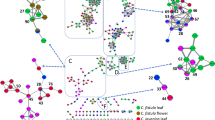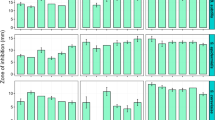Abstract
Rhizobacteria are valuable sources of compounds that can be used for the integrated management of diseases in rice. Here, we aimed to explore the metabolism and organize and annotate the metabolites of Bacillus sp. and Serratia marcescens isolates using molecular networking and evaluate their fungicidal effects against Magnaporthe oryzae and Bipolaris oryzae. We obtained bacterial extracts after 6 and 16-h incubation via liquid–liquid extraction using ethyl acetate as solvent. We performed UHPLC-MS analysis and data processing using molecular networking and conducted biological assays in rice plants. Using the Global Natural Product Social spectral libraries, we annotated the following compounds: austinoneol, Phe-Pro, N-acetyl-l-leucine, Leu-Gly, Ile-Leu, Phe-Pro, 2,5-piperazinedione, 3-(1H-indol-3-methyl)-6-methyl-cyclo(d-Trp-l-Pro), and cholic acid. Results of the biological assays showed that the bacterial extracts reduced the mycelial growth of both pathogens in all treatments compared to the control. In the greenhouse setup, 8 days after the challenge for leaf gray spot and leaf blast, all treatments affected up to 4.4% of the leaf area, with an area under disease progress curve of 13.24, showing significant difference compared to the control, which affected 23% of the leaf area, with an AUDPC of 44.65. Our study provides potential new sources of natural products to be applied in the integrated management of rice.





Similar content being viewed by others

Availability of data and material
All data have been provided as supplementary material.
References
Arriel-Elias MT, de Carvalho Barros Côrtes MV, de Sousa TP, Chaibub AA, de Filippi MCC (2019) Induction of resistance in rice plants using bioproducts produced from Burkholderia pyrrocinia BRM 32113. Environ Sci Pollut Res. https://doi.org/10.1007/s11356-019-05238-3
Arriel-Elias MT, Oliveira MIS, Silva-Lobo VL, Filippi MCC, Babana AH, Conceição EC, Cortes MVCB (2018) Shelf life enhancement of PGPRs using a simple formulation screening method. Afr J Microbiol Res 12(5):1156–2126. https://doi.org/10.5897/AJMR2017.8787
Arriel-Elias MT, de Carvalho Barros Côrtes MV, de Sousa TP, Chaibub AA, Filippi M (2019) Induction of resistance in rice plants using bioproducts produced from Burkholderia pyrrocinia BRM 32113. Environ Sci Pollut Res 26:19705–19718. https://doi.org/10.1007/s11356-019-05238-3
Batista BD (2017) Promoção de crescimento vegetal por Bacillus Sp. RZ2MS9: Dos Genes ao Campo. https://doi.org/10.11606/T.11.2017.tde-15082017-170543
Bazioli JM, Amaral LS, Fill TP, Rodrigues-Filho E (2017) Insights into Penicillium brasilianum secondary metabolism and its biotechnological potential. Molecules 22(6):858. https://doi.org/10.3390/molecules22060858
Brakhage AA (2013) Regulation of fungal secondary metabolism. Nat Rev Microbiol 11(1):21–32. https://doi.org/10.1038/nrmicro2916
Claus D, Berkeley RCW (1986) Genus Bacillus Cohn, 1872. In: Sneath, P.H.A., Mair, N.S., Sharpe, M.E. and J.G. Holt., Ed., Bergey’s Manual of Systematic Bacteriology, The Williams & Wilkins Co., Baltimore, v.2
Côrtes ACAS, Sousa TP, Barros MV, Rodrigues FA, Silva GB, Filippi MCC (2015) Enzyme-induced defense response in the suppression of rice leaf blast (Magnaporthe oryzae) by silicon fertilization and bioagents. Int J Res Stud Biosci 3:22–32
Costa JH, Bazioli JM, Barbosa LD, dos Santos Júnior PLT, Reis FCG, Klimeck T, Crnkovic CM, Berlinck RGS, Sussulini A, Rodrigues ML, Fill TP (2021) Phytotoxic tryptoquialanines produced in vivo by Penicillium digitatum are exported in extracellular vesicles. Mbio 12(1):e03393–e03420. https://doi.org/10.1128/mBio.03393-20
D’Ávila LS, De Filippi MCC, Café-Filho AC (2021) Sensitivity of Pyricularia oryzae populations to fungicides over a 26-year time frame in Brazil. Plant Dis 105(6):1771–1780. https://doi.org/10.1094/pdis-08-20-1806-re
Degtyarenko IM, Nieminen RM (2010) Chapter 15—dynamics of biomolecules from first principles. Sci Technol Atom Mol Condens Matter Biol Syst 1:557–573. https://doi.org/10.1016/B978-0-444-53440-8.00015-X
Ernst M, Kang KB, Caraballo-Rodríguez AM, Nothias LF, Wandy J, Chen C, Wang M, Rogers S, Medema MH, Dorrestein PC, Van der Hooft JJJ (2019) MolNetEnhancer: enhanced molecular networks by integrating metabolome mining and annotation tools. Metabolites 9(7):144. https://doi.org/10.3390/metabo9070144
Filippi MCC, Silva GB, Silva-Lobo V, Côrtes MVCB, Moraes AJG, Prabhu AS (2011) Leaf blast (Magnaporthe oryzae) suppression and growth promotion by rhizobacteria on aerobic rice in Brazil. Biol Control 58:160–166. https://doi.org/10.1016/j.biocontrol.2011.04.016
Gwinn KD (2018) Bioactive natural products in plant disease control. Stud Nat Prod Chem. https://doi.org/10.1016/B978-0-444-64058-1.00007-8
Hisien-Chun Kim L, Entwistle R, Guo CJ, Ahuja M, Szewczyk E, Hung JH, Chiang YM, Oakley BR, Wang CC (2012)Two separate gene clusters encode the biosynthetic pathway for the meroterpenoids austinol and dehydroaustinol in Aspergillus nidulans. J Am Chem Soc 134(10):4709–4720. https://doi.org/10.1021/ja209809t
Ibrahim D (2015) Antimicrobial activity of Penicillium minioluteum ED24, an endophytic fungus residing in Orthosiphon stamineus Benth. World J Pharm Pharm Sci 3(3):121–132
Jamie H (2002) The medicinal chemistry of the isomers of the cyclic dipeptide: cyclo (TRP-PRO). Submitted in fulfilment of the requirements for the degree of PHILOSOPHIAE DOCTOR in the Faculty of Health Sciences, at the University of Port Elizabeth
Kanzaki H, Mizuta N, Nitoda T, Kawazu K (2000) Novel diketopiperazine metabolism in a microorganism: two-step hydrolysis of cyclo(Gly-Leu) to amino acids and preliminary characterization of cyclo(Gly-Leu) hydrolase and dipeptidase. J Biosci Bioeng 89(6):602–605. https://doi.org/10.1016/S1389-1723(00)80064-X
Katz L, Baltz RH (2016) Natural product discovery: past, present, and future. J Ind Microbiol Biotechnol 43(2–3):155–176. https://doi.org/10.1007/s10295-015-1723-5
Khaldi N, Seifuddin FT, Turner G, Haft D, Nierman WC, Wolfe KH, Fedorova ND (2010) SMURF: Genomic mapping of fungal secondary metabolite clusters. Fungal Genet Biol 47:736–741. https://doi.org/10.1016/j.fgb.2010.06.003
Krithika K, Geetha Ramani D (2013) Screening of Serratia marcescens isolated from soil for secondary metabolites of therapeutic importance. Int J Bioassays 02(08):1162–1165
Lee W, Lee SH, Kim M, Moon JS, Kim GK, Jung HW, Kim IH, Oh JE, Jung HE, Lee HK, Ku KB, Ahn DG, Kim SJ, Kim KS, Oh JW (2018) Vibrio vulnificus quorum-sensing molecule cyclo(Phe-Pro) inhibits RIG-I-mediated antiviral innate immunity. Nat Commun 23(1):1606. https://doi.org/10.1038/s41467-018-04075-1
Lenz G, Balardin RS, Corte GD, Marques LN, Debona D (2010) Diagrammatic scale for assessment of rice brown spot severity. Ciência Rural 40:752–758 (in Portuguese).
Levenfors JJ, Hedmana R, Thaningb C, Gerhardsonb B, Welcha CJ (2004) Broad-spectrum antifungal metabolites produced by the soil bacterium Serratia plymuthica A 153. Soil Biol Biochem 36(4):677–685. https://doi.org/10.1016/j.soilbio.2003.12.008
Li Y, Yuana S, Yonga S, Zhaoa T, Liua J (2020) Research progress on small peptides in Chinese Baijiu. J Funct Foods 72:104081. https://doi.org/10.1016/j.jff.2020.104081
Liu S, Su M, Song SJ, Jung JH (2018) Marine-derived Penicillium species as producers of cytotoxic metabolites. Mar Drugs 15(10):329. https://doi.org/10.3390/md15100329
Lo HC, Entwistle R, Guo CJ, Ahuja M, Szewczyk E, Hung JH, Chiang YM, Oakley BR, Wang CC (2012) Two separate gene clusters encode the biosynthetic pathway for the meroterpenoids austinol and dehydroaustinol in Aspergillus nidulans. J Am Chem Soc 134(10):4709–4720. https://doi.org/10.1021/ja209809t
Martins BEM, Chaibub AA, Cortes MVCB, Silva-Lobo VL, Filippi MCC (2020) Characterization of bacterial isolates for sustainable rice blast control. Rev Caatinga 33:702–712. https://doi.org/10.1590/1983-21252020v33n313rc
Matteoli FP, Passarelli-Araujo HP, Reis RJA, Rocha LO, Souza EM, Aravind L, Olivares FL, Venancio TM (2018) Genome sequencing and assessment of plant growth-promoting properties of a Serratia marcescens strain isolated from vermicompost. BMC Genom 19(1):750. https://doi.org/10.1186/s12864-018-5130-y
Melo FMP (2005) Atividade antifúngica de metabólitos secundários produzidos pelo endófito de mandioca Bacillus pumilus MAIII4a. Dissertação. Escola Superior de Agricultura Luiz de Queiroz. Universidade de São Paulo (USP), Piracicaba
McInroy JA, Kloepper JW (1995) Survey of indigenous bacterial endophytes from cotton and sweet corn. Plant and Soil 173(2):337–342. https://doi.org/10.1007/BF00011472
Morais JM, Yoshimoto M, Rhoden SA, Pamphile JA (2014) Bioprospecção de microrganismos produtores de compostos bioativos comatividade antitumoral. Uningá Rev 17(1):27–34
Morbach S, Sahm H, Eggeling L (1996) l-Isoleucine production with Corynebacterium glutamicum: Further flux increase and limitation of export. Appl Environ Microbiol 62(12):4345–4351. https://doi.org/10.1128/aem.62.12.4345-4351.1
Nascente AS, Filippi MCC, Lanna AC, Souza ACA, Silva-Lobo VL, Silva GB (2017) Biomass, gas exchange, and nutrient contents in upland rice plants affected by application forms of microorganism growth promoters. Environ Sci Pollut Res Int 24(3):2956–2965. https://doi.org/10.1007/s11356-016-8013-2
Nelson DL, Cox MM (2014) Princípios de bioquímica de lehninger, 6th edn. ARTMED, Porto Alegre
Notteghem JL (1981) Cooperative experiment on horizontal resistance to rice blast. In: Blast and upland rice: report and recommendations from the meeting for international collaboration in upland rice improvement. IRRI, Los Baños, pp 43–51
Oliveira SC, Castroagudin VL, Maciel JLN, Pereira DAS, Ceresini PC (2015) Cross-resistance to QoI fungicides azoxystrobin and pyraclostrobin in the wheat blast pathogen Pyricularia oryzae in Brazil. Summa Phytopathol 41:298–304. https://doi.org/10.1590/0100-5405/2072
Prabhu AS, Filippi MC (2006) Brusone em arroz: controle genética, progresso e perspectivas. Santo Antônio de Goiás, Embrapa
Rezende CC, Frasca LLM, Silva MA, Pires RAC, Lanna AC, Filippi MCC, Nascente AS (2021) Physiological and agronomic characteristics of the common bean as affected by multifunctional microorganisms. Semina Ciênc Agrárias 42(2):599–618. https://doi.org/10.5433/1679-0359.2021v42n2p599
Sangappillai V, Nadarajah K (2020) Fatty acid synthase beta dehydratase in the lipid biosynthesis pathway is required for conidiogenesis, pigmentation and appressorium formation in Magnaporthe oryzae S6. Int J Mol Sci 21:7224. https://doi.org/10.3390/ijms21197224
Sansinenea E, Ortiz A (2011) Secondary metabolites of soil Bacillus spp. Biotechnol Lett 33(8):1523–1538. https://doi.org/10.1007/s10529-011-0617-5
Santos RMG, Rodrigues-Filho E (2003) Structures of meroterpenes produced by Penicillium sp., an endophytic fungus found associated with Melia azedarach. J Braz Chem Soc 14(5):722–727. https://doi.org/10.1590/S0103-50532003000500004
Schürmann BTM (2010) Austin, dehydroaustin and other metabolites from Penicillium brasilianum. Quim Nova 33(5):1044–1046
Shaner G, Finney RF (1977) The effects of nitrogen fertilization on the expression slowmildewing in Knox wheat. Phytopathology 67:1051–1055
Silva MA, Nascente AS, Filippi MCC, Lanna AC, Silva GB, Fernandes JPT, Arriel-Elias MT (2020) Screening of beneficial microorganisms to improve soybean growth and yield. Braz Arch Biol Technol 63(2):e20190463. https://doi.org/10.1590/1678-4324-2020190463
Sousa TP, Souza ACA, Cortes MVCB, Lanna AC, Pinheiro HA, Filippi MCC, Silva GB (2017) Bioagents and silicon promoting fast early upland rice upland rice growth. Environ Sci Pollut Res 25:3657–3668. https://doi.org/10.1007/s11356-017-0753-0
Sperandio EM, Vale HMM, Reis MS, Cortes MVCB, Lanna AC, Filippi MCC (2017) Evaluation of rhizobacteria in upland rice in Brazil: growth promotion and interaction of induced defense responses against leaf blast (Magnaporthe oryzae). Acta Physiol Plant 39:259. https://doi.org/10.1007/s11738-017-2547-x
Ström K, Sjögren J, Broberg A, Schnürer J (2002) Lactobacillus plantarum MiLAB 393 produces the antifungal cyclic dipeptides cyclo(L-Phe-L-Pro) and cyclo(L-Phe-trans-4-OH-L-Pro) and 3-phenyllactic acid. Appl Environ Microbiol 68(9):4322–4327. https://doi.org/10.1128/AEM.68.9.4322-4327.2002
Sumner LW, Amberg A, Barrett D et al (2007) Proposed minimum reporting standards for chemical analysis Chemical Analysis Working Group (CAWG) Metabolomics Standards Initiative (MSI). Metabolomics 3(3):211–221. https://doi.org/10.1007/s11306-007-0082-2
Sumner LW et al (2013) Proposed quantitative and alphanumeric metabolite identification metrics. Metabolomics 10:1047–1049
Vicente CSL, Nascimento FX, Ikuyo Y, Cock PJA, Mota M, Hasegawa K (2016) The genome and genetics of a high oxidative stress tolerant Serratia sp. LCN16 isolated from the plant parasitic nematode Bursaphelenchus xylophilus. BMC Genom 17:301. https://doi.org/10.1186/s12864-016-2626-1
Vogel J, Quax WJ (2019) Chapter 7—enzymatic quorum quenching in biofilms. Molecular mechanism and biotechnological application. Academic Press, New York, pp 173–193
Acknowledgements
The authors would like to thank the Coordination for the Improvement of Higher Education Personnel (CAPES) for the scholarship.
Funding
This research received financial support from the Embrapa and National Council for Scientific and Technological Development (CNPq, 433582/2018-9).
Author information
Authors and Affiliations
Contributions
All authors contributed to the study conception and design. Material preparation, data collection and biological analysis were performed by MTAE, GCTFA and GAB. AKP and GA performed all the analysis of molecular networking and prepared all the figures and tables. MCCF, VGPS and TPF supervised the whole study. The first draft of the manuscript was written by MTAE, and all authors commented on previous versions of the manuscript. All authors read and approved the final manuscript.
Corresponding author
Ethics declarations
Conflict of interest
The authors declare that the research was conducted in the absence of any commercial or financial relationships that could be construed as a potential conflict of interest.
Supplementary Information
Below is the link to the electronic supplementary material.
Rights and permissions
Springer Nature or its licensor (e.g. a society or other partner) holds exclusive rights to this article under a publishing agreement with the author(s) or other rightsholder(s); author self-archiving of the accepted manuscript version of this article is solely governed by the terms of such publishing agreement and applicable law.
About this article
Cite this article
Arriel-Elias, M.T., Pereira, A.K., Arriel, G.C.T.F. et al. Molecular networking as a tool to annotate the metabolites of Bacillus sp. and Serratia marcescens isolates and evaluate their fungicidal effects against Magnapothe oryzae and Bipolaris oryzae. 3 Biotech 13, 148 (2023). https://doi.org/10.1007/s13205-023-03547-6
Received:
Accepted:
Published:
DOI: https://doi.org/10.1007/s13205-023-03547-6



